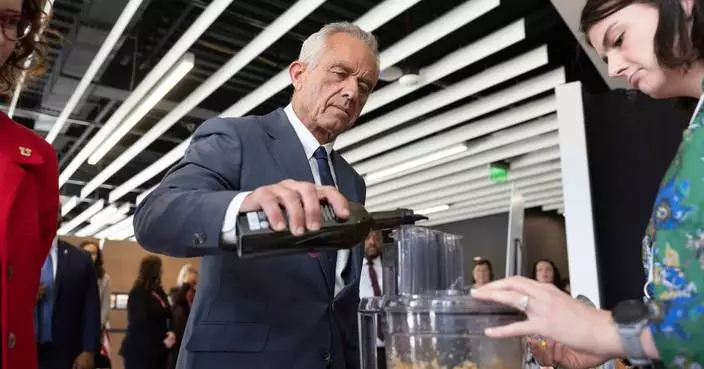Dow, a major producer of chemicals and plastics, wants to use next-generation nuclear reactors for clean power and steam at a Texas manufacturing complex instead of natural gas.
Dow's subsidiary, Long Mott Energy, applied Monday to the U.S. Nuclear Regulatory Commission for a construction permit. It said the project with X-energy, an advanced nuclear reactor and fuel company, would nearly eliminate the emissions associated with power and steam generation at its plant in Seadrift, Texas, avoiding roughly 500,000 metric tons of planet-warming greenhouse gas emissions annually.
If built and operated as planned, it would be the first U.S. commercial advanced nuclear power plant for an industrial site, according to the NRC.
For many, nuclear power is emerging as an answer to meet a soaring demand for electricity nationwide, driven by the expansion of data centers and artificial intelligence, manufacturing and electrification, and to stave off the worst effects of a warming planet. However, there are safety and security concerns, the Union of Concerned Scientists cautions. The question of how to store hazardous nuclear waste in the U.S. is unresolved, too.
Dow wants four of X-energy's advanced small modular reactors, the Xe-100. Combined, those could supply up to 320 megawatts of electricity or 800 megawatts of thermal power. X-energy CEO J. Clay Sell said the project would demonstrate how new nuclear technology can meet the massive growth in electricity demand.
The Seadrift manufacturing complex, at about 4,700 acres, has eight production plants owned by Dow and one owned by Braskem. There, Dow makes plastics for a variety of uses including food and beverage packaging and wire and cable insulation, as well as glycols for antifreeze, polyester fabrics and bottles, and oxide derivatives for health and beauty products.
Edward Stones, the business vice president of energy and climate at Dow, said submitting the permit application is an important next step in expanding access to safe, clean, reliable, cost-competitive nuclear energy in the United States. The project is supported by the Department of Energy’s Advanced Reactor Demonstration Program.
The NRC expects the review to take three years or less. If a permit is issued, construction could begin at the end of this decade so the reactors would be ready early in the 2030s, as the natural gas-fired equipment is retired.
A total of four applicants have asked the NRC for construction permits for advanced nuclear reactors. The NRC issued a permit to Abilene Christian University for a research reactor and to Kairos Power for one reactor and two reactor test versions of that company's design. It's reviewing an application by Bill Gates and his energy company, TerraPower, to build an advanced reactor in Wyoming.
X-energy is also collaborating with Amazon to bring more than 5 gigawatts of new nuclear power projects online across the United States by 2039, beginning in Washington state. Amazon and other tech giants have committed to using renewable energy to meet the surging demand from data centers and artificial intelligence and address climate change.
The Associated Press’ climate and environmental coverage receives financial support from multiple private foundations. AP is solely responsible for all content. Find AP’s standards for working with philanthropies, a list of supporters and funded coverage areas at AP.org.

FILE - A Dow sign is shown in Midland, Mich., Aug. 2, 2019. (AP Photo/Paul Sancya, File)
WASHINGTON (AP) — The Supreme Court on Monday allowed the Trump administration to use an 18th century wartime law to deport Venezuelan migrants, but said they must get a court hearing before they are taken from the United States.
In a bitterly divided decision, the court said the administration must give Venezuelans who it claims are gang members “reasonable time” to go to court.
But the conservative majority said the legal challenges must take place in Texas, instead of a Washington courtroom.
The court’s action appears to bar the administration from immediately resuming the flights that last month carried hundreds of migrants to a notorious prison in El Salvador. The flights came soon after President Donald Trump invoked the Alien Enemies Act for the first time since World War II to justify the deportations under a presidential proclamation calling the Tren de Aragua gang an invading force.
The majority said nothing about those flights, which took off without providing the hearing the justices now say is necessary.
In dissent, the three liberal justices said the administration has sought to avoid judicial review in this case and the court “now rewards the government for its behavior.” Justice Amy Coney Barrett joined portions of the dissent.
Justice Sonia Sotomayor said it would be harder for people to challenge deportations individually, wherever they are being held, and noted that the administration has also said in another case before the court that it’s unable to return people who have been deported to the El Salvador prison by mistake.
“We, as a Nation and a court of law, should be better than this,” she wrote.
The justices acted on the administration’s emergency appeal after the federal appeals court in Washington left in place an order temporarily prohibiting deportations of the migrants accused of being gang members under the rarely used Alien Enemies Act.
“For all the rhetoric of the dissents,” the court wrote in an unsigned opinion, the high court order confirms “that the detainees subject to removal orders under the AEA are entitled to notice and an opportunity to challenge their removal."
The case has become a flashpoint amid escalating tension between the White House and the federal courts. It's the second time in less than a week that a majority of conservative justices has handed Trump at least a partial victory in an emergency appeal after lower courts had blocked parts of his agenda.
Several other cases are pending, including over Trump's plan to deny citizenship to U.S.-born children of parents who are in the country illegally.
Trump praised the court for its action Monday.
"The Supreme Court has upheld the Rule of Law in our Nation by allowing a President, whoever that may be, to be able to secure our Borders, and protect our families and our Country, itself. A GREAT DAY FOR JUSTICE IN AMERICA!” Trump wrote on his Truth Social site.
The original order blocking the deportations to El Salvador was issued by U.S. District Judge James E. Boasberg, the chief judge at the federal courthouse in Washington.
Attorneys from the American Civil Liberties Union filed the lawsuit on behalf of five Venezuelan noncitizens who were being held in Texas, hours after the proclamation was made public and as immigration authorities were shepherding hundreds of migrants to waiting airplanes.
ACLU attorney Lee Gelernt said the “critical point" of the high court’s ruling was that people must be allowed due process to challenge their removal. "That is an important victory,” he said.
Boasberg imposed a temporary halt on deportations and also ordered planeloads of Venezuelan immigrants to return to the U.S. That did not happen. The judge held a hearing last week over whether the government defied his order to turn the planes around. The administration has invoked a “ state secrets privilege ” and refused to give Boasberg any additional information about the deportations.
Trump and his allies have called for impeaching Boasberg. In a rare statement, Chief Justice John Roberts said “impeachment is not an appropriate response to disagreement concerning a judicial decision.”
Associated Press writer Lindsay Whitehurst contributed to this report.

Venezuelan migrants deported from the United States peer through windows of an Eastern Airlines plane upon arriving at Simon Bolivar International Airport in Maiquetia, Venezuela, Sunday, March 30, 2025. (AP Photo/Cristian Hernandez)




















































